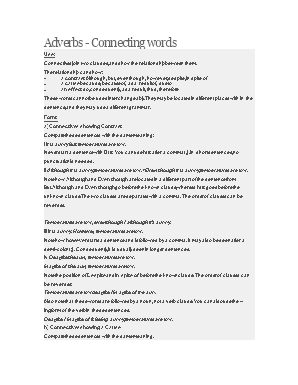Ngữ pháp môn Tiếng Anh Lớp 10 - Adverbs-Connecting words
Bạn đang xem tài liệu "Ngữ pháp môn Tiếng Anh Lớp 10 - Adverbs-Connecting words", để tải tài liệu gốc về máy bạn click vào nút DOWNLOAD ở trên

Adverbs - Connecting words Use: Connectives join two clauses, and show the relationship between them. The relationship can show: a contrast Although, but, even though, however, despite, in spite of a cause because, because of, as a result of, due to an effect so, consequently, as a result, thus, therefore These words cannot be used interchangeably. They may be located in different places with in the sentence, and they may use a different grammar. Form: a) Connectives showing Contrast Compare these sentences with the same meaning: i It is sunny but temperatures are low. Never start a sentence with But. You can use but after a comma(,). In short sentences, no punctuation is needed. ii Although it is sunny, temperatures are low. / Even though it is sunny, temperatures are low. Note how Although and Even though are located in a different part of the sentence from But.Although and Even though go before the known clause, whereas but goes before the unknown clause. The two clauses are separated with a comma. The order of clauses can be reversed. Temperatures are low, even though / although it’s sunny. iii It is sunny. However, temperatures are low. Note how however starts a sentence and is followed by a comma. It may also be seen after a semi-colon (;). Consequently, it is usually seen in longer sentences. iv Despite the sun, temperatures are low. In spite of the sun, temperatures are low. Note the position of Despite and In spite of before the known clause. The order of clauses can be reversed: Temperatures are low despite / in spite of the sun. Also note that these words are followed by a noun, not a verb clause. You can also use the –ingform of the verb in these sentences. Despite / In spite of it being sunny, temperatures are low. b) Connectives showing a Cause Compare these sentences with the same meaning. i I arrived late because the traffic was bad. Because the traffic was bad, I arrived late. Note you can ONLY start a sentence with Because if there are two clauses in the sentence. Because we were late. INCORRECT Because we were late, we missed the start of the show. CORRECT Starting a sentence with Because is more formal than using it in the middle of a sentence, and is most commonly used in writing, not speaking. ii I arrived late because of the bad traffic. OR Because of the bad traffic, I arrived late. I arrived late due to the bad traffic. OR Due to the bad traffic, I arrived late. I arrived late as a result of the bad traffic. OR As a result of the bad traffic, I arrived late. Note how these expressions are followed by a noun, not a verb clause. c) Connectives showing Effect Compare these sentences with the same meaning. i We were late so we missed the beginning of the show. Never start a sentence with So. So can follow a comma(,). In short sentences, no punctuation is needed. ii We were late and thus we missed the beginning of the show. We were late and consequently we missed the beginning of the show. We were late and as a result we missed the beginning of the show. We were late and therefore we missed the beginning of the show. Consequently, As a result, Therefore and Thus are more formal than So. They are common in formal sentences. They often start a sentence, but they can be joined to the previous sentence with and. Common Mistakes: 1. Some students begin sentences with But and So. Joe went to university. But he didn’t like it. → Joe went to university, but he didn’t like it. 2. Some students write a sentence with because and only one clause. I went to the shop. Because I needed some bread. → I went to the shop because I needed some bread. 3. Some students do not use nouns when they needed to. I went indoors due to it was cold outside. → I went indoors due to the cold weather outside.
Tài liệu đính kèm:
 Adverbs - Trạng từ.doc
Adverbs - Trạng từ.doc





